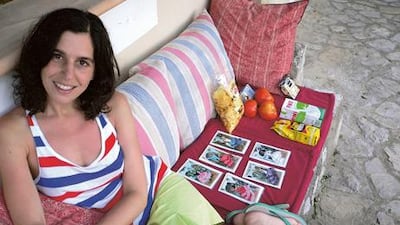"The noise of shelling remains in me. When I hear firecrackers I still go and hide."
Books: The National Reads
Book reviews, festivals and all things literary
The artist Lamia Ziadé is trying to explain, 36 years on, the scarring effects of having grown up in the midst of the Lebanese civil war. As a child, she was as familiar with the sounds of incoming artillery shells as the smells from her favourite patisserie. Her parents' apartment in Beirut was destroyed, the neighbourhood around it an "apocalyptic scene". But they refused to leave Lebanon.
Unsurprisingly Ziadé didn't feel ready to confront her traumatic childhood for decades. But rather than use large canvases and violent imagery as a form of therapy, she embarked upon a far more innovative project. Using the Pop Art style made famous by Andy Warhol's depiction of Campbell's soup cans, she created a bold, colourful graphic memoir about her experiences. Sparkling depictions of automatic weapons sit next to illustrations of Bazooka bubblegum and tubs of Nivea hand cream. The result is the intriguing Bye Bye Babylon. Part picture book, part autobiography and somehow both heartbreaking and devastatingly funny, the English translation is out this week.
"It was very important for me not to write a gloomy book," she says from her Paris home when I ask her why her war memoir seems to have such a sunny disposition.
"It's not my style. In Lebanon in the 1970s we were very influenced by western brands, so it felt natural to have a Pop Art feel. It seemed to fit the iconography of the era somehow."
In fact, Ziadé had initially just intended to make a series of drawings that would catalogue the objects, places and personalities of the war. But as she completed her 50th image, she realised there was a more personal story that could be told, a child's-eye view of the inherent ridiculousness of the civil war. One memorable image places an armed man outside a shop riddled with bullet holes. The accompanying text notes that the enemy militiamen would agree to stop the battle to loot the shops, fill their bags, and then resume combat.
"You know, in general, the Lebanese have been very proud of this extravagant side to the war," she laughs. "It doesn't mean that it wasn't heartbreaking and painful, but the folklore of it is perhaps unique to Lebanon. In the book there's the nostalgia of the objects and retro-style brands, but there's also the nostalgia of war itself. That's undoubtedly something stranger. I know I'm not the only Lebanese of my age or era to feel this."
And though the imagery and themes are often comical, the situation was anything but. A city she had come to think of as paradise had no running water, petrol shortages, mortar fire, snipers and the threat of abductions. One of the most affecting parts of Bye Bye Babylon explores the time her parents were trapped in a hotel in a dangerous part of Beirut.
"My parents, who have never wanted to emigrate ... [are] suicidal Middle Easterners," she writes. "This means that my childhood will be regulated by a pattern of dreadful events."
Does she resent their actions now?
"I think they stayed because they loved their country, although those who left certainly didn't love their country less," she says. "I still don't really have an answer to this question. It might have been laziness about having to start all over again. It could have been that my father was passionate about politics - he knew journalists and politicians and they were always discussing the situation. Or maybe they were simply reckless."
The fact that Ziadé still can't make judgements about her parents' motivations - or indeed those of her fellow countrymen - is actually one of the strengths of the book. Ziadé's family are Christian but in a war fought across a staggering array of political, ideological and religious lines, it's barely mentioned.
"It was extremely important for me that my religion didn't take up much room in the book," she says. "Especially in a country where religious fanaticism has done a lot of damage. I'm not particularly proud of being Christian, in just the same way that I wouldn't have been particularly proud of being from any other religion."
Instead this is a book which, like Marjane Satrapi's Persepolis, draws wisdom from the eyes of a child. Ziadé was keen not to write from hindsight - so even though she now knows that Lebanon didn't collapse into civil war over the course of one lunchtime, in Bye Bye Babylon it does, because that's how it felt at the time. But did the experience of writing and drawing this book change her feelings about a country she describes as "collapsing into homicidal madness"?
"Well, I think that for a child to live during a war leaves scars that will never be erased from their life. But I adore Beirut. I'm a little worried about the direction it's going in - it could become that powder keg again. We close our eyes very easily to people's misery. But living in Paris, I do feel like part of my life is missing."
- Bye Bye Babylon (Jonathan Cape) is out on Thursday
Follow us on Twitter and keep up to date with the latest in arts and lifestyle news at twitter.com/LifeNationalUAE

